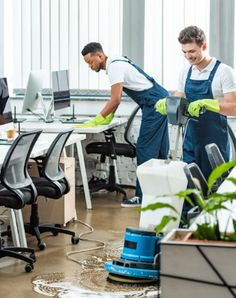Across every office building in Australia—from the buzzing coworking floors of Sydney to suburban legal firms in Perth—there’s one job that keeps everything humming quietly in the background. It’s not the IT team or the building manager. It’s the office cleaner.
But what exactly do you call the person who keeps your workplace fresh, hygienic, and professional every single day?
The simple answer: an office cleaner. But their role goes far beyond just “cleaning.”
This article explores the title, duties, and importance of office cleaners in Australian businesses—and why investing in professional Office Cleaning is one of the smartest decisions you can make.
What’s in a Job Title?
While “office cleaner” is the standard label, the role can also be listed as:
- Commercial cleaner
- Corporate cleaner
- Facilities cleaner
- Hygiene technician (in some sectors)
Regardless of the label, the responsibilities generally remain the same—ensuring that all workplace areas are clean, sanitised, and presentable.
It’s not just about emptying bins or vacuuming. A good cleaner maintains health standards, prevents the spread of illness, and protects your company’s first impression for clients and staff alike.
Why Office Cleaning Matters More Than You Think
Cleaners don’t just make the office look good. They play a key part in your company’s health, productivity, and reputation.
Healthier Employees
A clean office reduces dust, mould, and germs. With viruses still a concern, daily sanitising of high-touch areas—like desks, doorknobs, and kitchen surfaces—can make a measurable difference in sick leave and staff wellbeing.
Higher Productivity
A cluttered or dirty workspace affects focus and morale. In contrast, a tidy and hygienic environment helps people work better—and feel better while doing it.
Better Client Impressions
Walk into a spotless reception area and you’ll feel it straight away. Clients notice these details. Whether you’re a law firm or a tech startup, cleanliness speaks volumes about your standards.
For businesses serious about professional presentation, dedicated Office Cleaning services ensure these standards are consistently met.
What Do Office Cleaners Actually Do?
While every site is different, office cleaners typically handle:
- Emptying bins and replacing liners
- Vacuuming and mopping all floors
- Cleaning desks, chairs, and monitors (if instructed)
- Sanitising bathrooms, kitchens, and communal surfaces
- Cleaning glass partitions, doors, and windows
- Restocking toilet paper, soap, and other consumables
Many also perform occasional deep cleans, carpet steam cleaning, or sanitising fog treatments—particularly after flu season or special events.
The scope of work can vary based on the size of the workplace, daily foot traffic, and whether the service is nightly, weekly, or day-time ongoing.
In-House vs Contract Cleaners
Some businesses hire cleaners directly as in-house employees. Others use a commercial cleaning company.
In-house cleaners offer control and consistency but come with overheads like payroll, insurance, and HR compliance.
Contract cleaners provide flexibility, scalability, and reduced administrative burden. For small to mid-sized companies, outsourced Office Cleaning is often more cost-effective and easier to manage.
Who Hires Office Cleaners in Australia?
Virtually every industry employs office cleaners:
- Corporate offices
- Government departments
- Schools and universities
- Medical practices
- Call centres
- Law firms
- Coworking hubs
- Tech companies
It’s also worth noting that many buildings in Australia use shared cleaning contracts across multiple tenancies. This ensures common areas like lifts, lobbies, and bathrooms stay clean and consistent across the entire property.
A Day in the Life: Real Example
Consider a cleaner who starts at 6:00 pm after staff have left a mid-sized accounting firm in Melbourne CBD.
First, they empty bins at every desk. Then they vacuum meeting rooms, mop the kitchenette, wipe down touchpoints like fridge handles and lift buttons, and sanitise both bathrooms. They check supply levels and submit a report through an app. In 90 minutes, the office is ready for another full day.
That consistency—quiet, invisible, but essential—is what makes the role so important.
The Cleaning Industry in Numbers
According to IBISWorld, the commercial cleaning services industry in Australia is worth over $12 billion. Demand continues to rise as more businesses outsource for flexibility and expertise.
Hiring standards are also improving. Cleaners now often undergo security checks, infection control training, and WHS (Workplace Health and Safety) certification—especially for work in sensitive sites.
Final Thoughts
So, what do you call the person who cleans your office?
You call them the reason your workspace stays professional, healthy, and productive. Whether referred to as a cleaner, hygiene technician, or facility support, their impact is undeniable.
If you’re looking to improve cleanliness standards, reduce illness, or simply make a better impression on staff and visitors, investing in professional Office Cleaning isn’t just a cost—it’s a business advantage.

